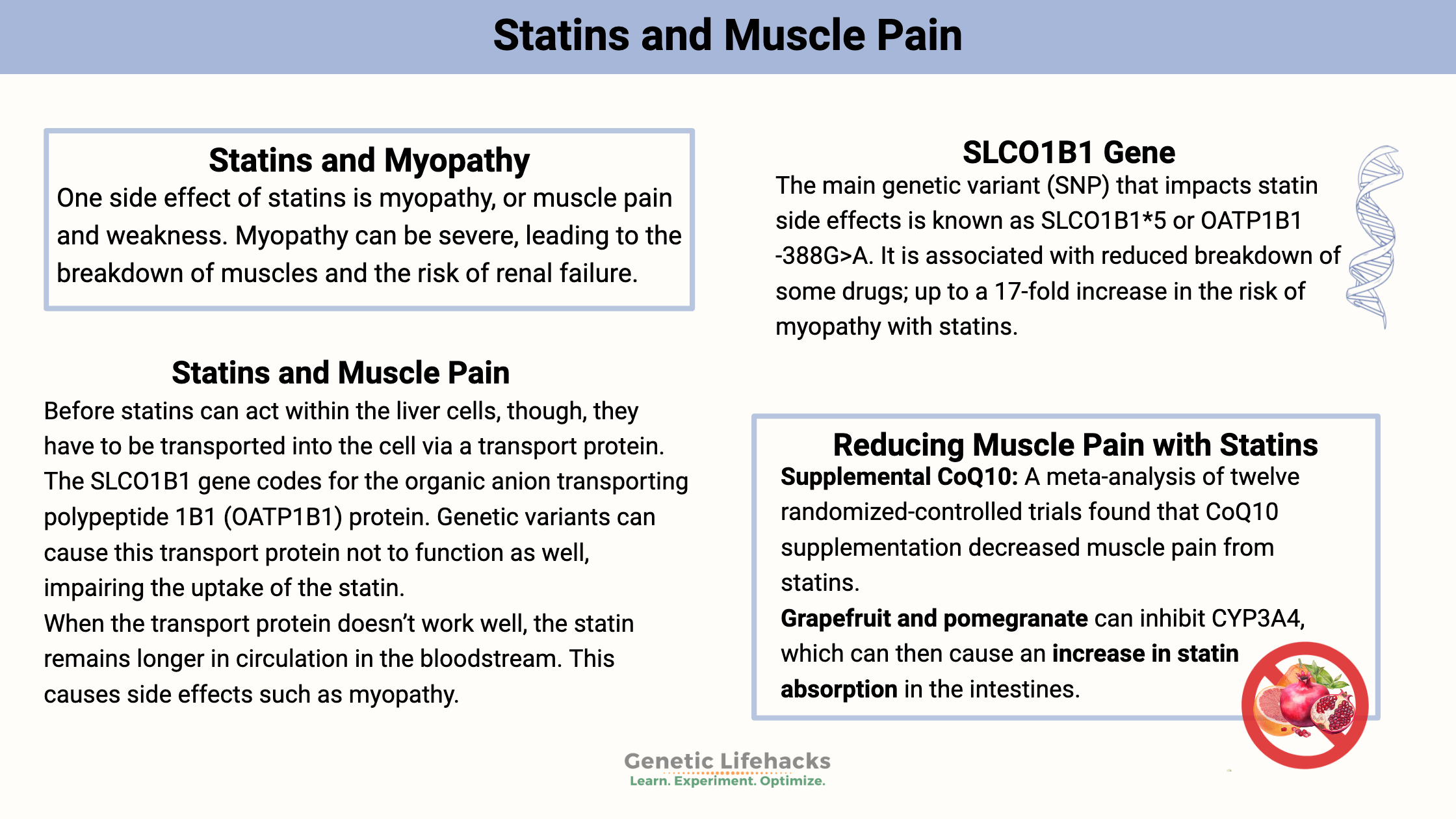Key takeaways:
~ Statins are used by tens of millions of people worldwide to lower cholesterol levels.[ref]
~ Statins inhibit the HMG-CoA enzyme to reduce cholesterol synthesis.
~ Genetic variants combine with statin usage to cause muscle pain in some individuals.
~ There are a number of natural options to reverse the muscle pain.
Statins and myopathy
Statins were first discovered in the 1970s from work with fungi. The first statin was isolated from Penicillium in 1973, and later in the 70s, Merck patented lovastatin made from Aspergillus terreus.[ref]
The most common side effect of statins is myopathy, or muscle pain and weakness. Myopathy can be severe, leading to the breakdown of muscles, called rhabdomyolysis, and increased risk of renal failure.
The risk of severe myopathy and kidney failure due to statins is small, but milder myotoxicity occurs in up to 29% of patients. This means that less severe damage occurs, but painful, muscle-related symptoms are present in quite a few patients who take statins.[ref]
Why do statins cause muscle pain?
Statins lower cholesterol levels by inhibiting the hydroxymethylglutaryl-coenzyme A reductase (HMG-CoA) enzyme, which is part of the pathway through which the body synthesizes cholesterol. Blocking this enzyme reduces cholesterol synthesis, leading to an increase in LDL receptor expression. More LDL receptors cause more LDL cholesterol to be removed from the bloodstream.
Before statins can act within the liver cells, though, they have to be transported into the cell via a transport protein, and this is where genetic differences play a big role.
The SLCO1B1 gene codes for the organic anion transporting polypeptide 1B1 (OATP1B1) protein. Genetic variants can cause this transport protein not to function as well, impairing the uptake of the statin.
When the transport protein doesn’t work well, the statin remains longer in circulation in the bloodstream. This causes side effects such as myopathy. The differences are stark – with one copy of a SLCO1B1 variant, there is up to a 5-fold increase in myopathy, and with two copies of the variant, there is up to a 17-fold increase in the odds of myopathy. (see the genotype report section below)[ref][ref]
The ABCG1 gene also encodes a transporter that is involved in cholesterol transport across cell membranes. Genetic variants in ABCG1 are also linked to an increased risk of either muscle pain or liver problems from statins.[ref]
Access this content:
An active subscription is required to access this content.
Related Articles and Topics:
Statins and Brain Fog: Exploring how statins impact memory and cognitive function
PCSK9 Gene: Understanding the variants that cause high or low LDL cholesterol
References:
Bai, Xue, et al. “Effects of SLCO1B1 and GATM Gene Variants on Rosuvastatin-Induced Myopathy Are Unrelated to High Plasma Exposure of Rosuvastatin and Its Metabolites.” Acta Pharmacologica Sinica, vol. 40, no. 4, Apr. 2019, pp. 492–99. PubMed, https://doi.org/10.1038/s41401-018-0013-y.
Brackman, Deanna J., et al. “Genome-Wide Association and Functional Studies Reveal Novel Pharmacological Mechanisms for Allopurinol.” Clinical Pharmacology and Therapeutics, vol. 106, no. 3, Sep. 2019, pp. 623–31. PubMed Central, https://doi.org/10.1002/cpt.1439.
Carr, Daniel F., et al. “Genomewide Association Study of Statin-Induced Myopathy in Patients Recruited Using the UK Clinical Practice Research Datalink.” Clinical Pharmacology and Therapeutics, vol. 106, no. 6, Dec. 2019, pp. 1353–61. PubMed, https://doi.org/10.1002/cpt.1557.
Dehghan, Abbas, et al. “Association of Three Genetic Loci with Uric Acid Concentration and Risk of Gout: A Genome-Wide Association Study.” Lancet (London, England), vol. 372, no. 9654, Dec. 2008, pp. 1953–61. PubMed, https://doi.org/10.1016/S0140-6736(08)61343-4.
du Souich, Patrick, et al. “Myotoxicity of Statins: Mechanism of Action.” Pharmacology & Therapeutics, vol. 175, Jul. 2017, pp. 1–16. PubMed, https://doi.org/10.1016/j.pharmthera.2017.02.029.
Harrington, Robert A. “Statins—Almost 30 Years of Use in the United States and Still Not Quite There.” JAMA Cardiology, vol. 2, no. 1, Jan. 2017, p. 66. DOI.org (Crossref), https://doi.org/10.1001/jamacardio.2016.4709.
Ichida, Kimiyoshi, et al. “Decreased Extra-Renal Urate Excretion Is a Common Cause of Hyperuricemia.” Nature Communications, vol. 3, Apr. 2012, p. 764. PubMed Central, https://doi.org/10.1038/ncomms1756.
Lee, Da Hoon, et al. “Association Between ABCG2 Polymorphism and Statin-Induced Adverse Events: A Meta-Analysis.” Cardiovascular Toxicology, vol. 25, no. 11, Nov. 2025, pp. 1761–67. Springer Link, https://doi.org/10.1007/s12012-025-10056-w.
Lee, Hannah H., and Richard H. Ho. “Interindividual and Interethnic Variability in Drug Disposition: Polymorphisms in Organic Anion Transporting Polypeptide 1B1 (OATP1B1; SLCO1B1 ).” British Journal of Clinical Pharmacology, vol. 83, no. 6, Jun. 2017, pp. 1176–84. DOI.org (Crossref), https://doi.org/10.1111/bcp.13207.
Li, Xingang, et al. “The Association between Genetic Polymorphisms and Simvastatin-Induced Myopathy: A Narrative Synthesis of Evidence.” Drug Research, vol. 69, no. 4, Apr. 2019, pp. 185–93. PubMed, https://doi.org/10.1055/a-0677-2944.
Liu, Jia, et al. “ABCG2 Rs2231142 Variant in Hyperuricemia Is Modified by SLC2A9 and SLC22A12 Polymorphisms and Cardiovascular Risk Factors in an Elderly Community-Dwelling Population.” BMC Medical Genetics, vol. 21, no. 1, Mar. 2020, p. 54. PubMed, https://doi.org/10.1186/s12881-020-0987-4.
“SLCO1B1 Variants and Statin-Induced Myopathy — A Genomewide Study.” New England Journal of Medicine, vol. 359, no. 8, Aug. 2008, pp. 789–99. DOI.org (Crossref), https://doi.org/10.1056/NEJMoa0801936.

